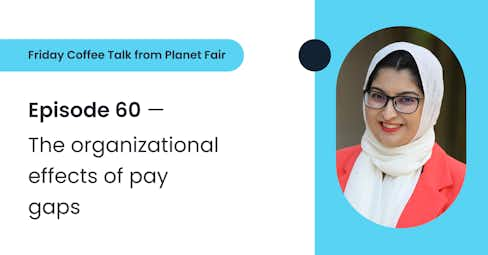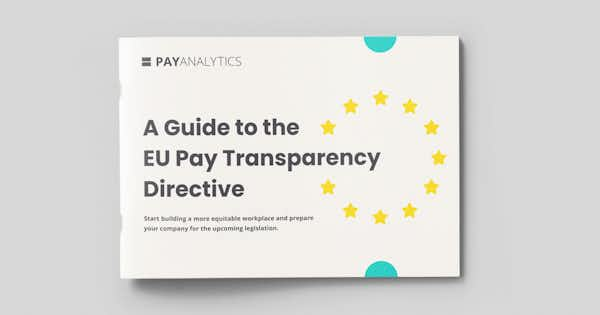Se préparer à la directive européenne sur la transparence salariale | Téléchargez gratuitement notre E-book
#60 - Sana Zafar on the surprising effects of pay gaps
It’s intuitive that a gender pay gap would leave women feeling less than satisfied in the workplace. But according to Sana Zafar, our coffee talk guest, the real effect is more nuanced. Pay gaps lead to lower satisfaction among both women and men, but through different mechanisms.

What are the effects pay gaps have on workplaces?
If an organization has a large gender pay gap, we would expect employees, especially women, to become dissatisfied with the organization. But surprisingly, not much research has really examined this commonsense assumption.
Margrét’s guest on this week’s coffee talk is a researcher who is doing this work and looking at the real-world effects of pay gaps. Sana Zafar is a postdoctoral associate at the University of Florida, and she also has an extensive HR background.
Sana says that there’s a reason why studies like hers are few and far between. Effects of the pay gap within organizations are difficult to measure, and there are not many good datasets available.
However, Sana and her colleagues have been able to access two exceptional datasets. The first dataset is made up of pay data collected over a period of nine years from 125 U.S. government sub-agencies. The second dataset is from the same sub-agencies and was generated by surveys asking about employees’ satisfaction with their employers.
Sana’s pay equity research led to two surprising findings.
The first surprise is that even after accounting for any factors that might legitimately affect pay, Sana’s research showed a 5% average difference between the pay of men and the pay of women within the same sub-organizations.
Given this big equal pay gap, we might expect women to be unhappy with their employer and men to feel fairly unaffected. But here is Sana’s second surprising finding: the reality is a little more complicated.
As the gender pay gap increases, Sana says, both men and women become less satisfied with the organization—but for different reasons. Women are directly affected by the pay gap and are dissatisfied with receiving lower pay. However, they generally understand that the pay gap is a large-scale social and structural issue—it’s not limited to just their employer. Men, on the other hand, are less aware of gender pay gaps in general. So if they become aware that their organization has a gender pay gap, they may be disappointed in the organization for allowing it to happen.
In other words, women don’t blame their employer for the pay gap, but it does decrease their satisfaction. Men see a pay gap as organizational tolerance of a practice that should not be tolerated, so it decreases their satisfaction.
So what can organizations and HR professionals take away from this research? Sana says that first, it’s important to understand that equal pay actually benefits all genders within an organization, not just women. Second, even when an organization is doing its best to be fair in setting their salaries, it’s possible for unintended bias to play a role in decision making. So regular audits are important to make sure that employees’ pay is truly equitable.
Watch the full talk with Margrét and Sana 👇
If you’d like to learn more about how to work for pay equity within your organization, you might find our ultimate guide useful. And if you’d like to talk to one of our experts about fair pay within your organization, you can book a 1:1 conversation or simply get in touch with questions.
Friday Coffee Talk from Planet Fair is a podcast/videocast series co-hosted by PayAnalytics founder Margrét Bjarnadóttir and Henrike Von Platen, founder and CEO of the FPI Fair Pay Innovation Lab in Berlin. It is available through all podcast platforms as well as on YouTube as a videocast.


